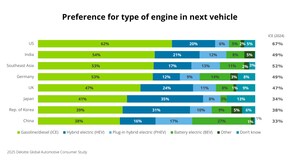Deloitte: US Investment of $130B to $150B in Deep Fiber Infrastructure Required to Lead Global Digital Economy Opportunity
- Future of connectivity remains uncertain in the U.S.; investment needed to ensure U.S. is 5G ready
- Vast discrepancies in choice, affordability and performance exist between rural, underserved and urban geographies
- Deep fiber paramount to unleashing wireless innovation, internet of things (IoT) functionality and immersive entertainment
NEW YORK, June 27, 2017 /PRNewswire/ -- The U.S. requires an investment of $130 billion to $150 billion in fiber infrastructure over the next five to seven years. Investment in deep fiber (i.e., fiber in the access network closer to the end customer) can unlock the full potential of the opportunities associated with fifth generation mobile network (5G) while also enhancing broadband competition and rural broadband coverage, as per a Deloitte study released today.
The report titled "Communications Infrastructure Upgrade – The Need for Deep Fiber" notes that a 5G ready communications infrastructure could unlock unprecedented potential to build seamless digital ecosystems, potentially reshaping the way citizens live, work and interact, dramatically stimulating economic productivity in the U.S. The report underscores the need for new investment and monetization models to adequately support rapid and massive fiber investment.
"Network infrastructure is among the key factors in a nation's economic growth potential and status as an innovator, and ultimately in propelling our economy's gross domestic product and job growth," said Craig Wigginton, vice chairman and telecommunications sector leader, Deloitte & Touche LLP. "We see a 5G ready U.S. infrastructure as critical to enabling a range of other adjacent industries to compete globally and safeguard our digital economy."
Deep fiber: the next front in the battle to lead the world in internet speed and capacity
For carriers to support the projected fourfold increase in mobile data traffic between 2016 and 2021, deep fiber will be critical. Despite the expected demand and potential economic benefits of fiber deployment, the U.S. currently lacks the fiber density in access networks to make the bandwidth advancements necessary to improve the pace of innovation and economic growth.
The report further notes that deep fiber deployment will not only increase broadband service choice for residential customers, it will also be key for the national infrastructure imperative to provide consumers high-speed broadband connections no matter where they live at prices they can afford, closing the "digital divide."
"It is essential that fiber gets deployed closer to the customer to enable next generation wireless and to ensure affordable high speed connectivity across urban, suburban and rural geographies," said Dan Littmann, principal, Deloitte Consulting LLP. "Motivating this investment requires the removal of legacy regulations, faster migration to IP networks; and new monetization mechanisms that allow carriers and investors to justify upfront investment in fiber."
Expanding access
The report notes that fiber currently passes less than one-third of U.S. homes, and only 39 percent of consumers have access to more than one broadband provider of at least 25 megabits per second (Mbps) service. Approximately 10 million rural homes and 3 million urban/ suburban homes do not have broadband of at least 25 Mbps. Furthermore, in rural communities, only 61 percent of the population have access to 25 Mbps wireline broadband, and when they do, they can pay as much as three times more than suburban customers.
There are shared responsibilities for carriers and policymakers to motivate deep fiber investment
The report suggests that failure to motivate investment in deep fiber could result in negative consequences, including insufficient network densification to support wireless traffic growth, 5G deployment and associated use cases, lack of choice for consumer broadband, and the widening of the digital divide.
In addition to establishing deep fiber as a top priority investment for the long term, carriers could enhance their ability to realize cost savings by adhering to a transformation program that creates industry standards for IP product mapping to substitute legacy products, and investing in digital processes aimed at faster product development and provisioning.
U.S. policymakers should consider:
- Eliminating regulatory barriers that prevent carriers from operating a single IP network, impede deployment of additional fiber assets, or restrict the types of services that may be offered.
- Avoiding regulation that limits carrier innovation in creating new monetization mechanisms.
- Reforming the Universal Services Administrative Company internal operations to meet broader goals of expanding fiber infrastructure and addressing rural internet access to close the digital divide.
New monetization mechanisms needed to encourage deep fiber investment:
The report suggests that IP migration and regulatory reforms, while important, will not be enough to create the case for fiber deployment. Wireless, wireline and cable require creative new ways to monetize "last mile" access as an incentive for massive fiber deployment. The report contemplates three potential models:
- Synergies between deep fiber and adjacent services in an "unlimited" world: Gartner predicts that affluent households will have up to 500 connected devices by 2022. In some cases, IoT services offer the prospect of new revenue. However, most connected devices will require low bandwidth or be WiFi enabled and, therefore, may not provide carriers with incremental revenue. In such cases, carriers have an opportunity to increase revenue by offering integration, network security, and traffic management services within the increasingly complex mix of IoT devices and ecosystems.
- Partnership between carriers and OTT players to fund deep fiber: As limited fiber availability constrains increased wireless densification and fiber broadband, over the top players may choose to fund fiber deployment, including owning assets or forming partnerships with carriers.
- Deep fiber as a financial investment: Insufficient supply of deep fiber and overwhelming demand growth are strong fundamentals for fiber investment. As interest grows from nontraditional fiber investors, we expect shared infrastructure models to emerge for last mile fiber access. Fiber as leased real estate could allow carriers to maximize asset utilization.
Connect with us on Twitter: @DeloitteTMT, @CraigWigginton and #5GReady.
About Deloitte
Deloitte provides industry-leading audit, consulting, tax and advisory services to many of the world's most admired brands, including 80 percent of the Fortune 500 and more than 6,000 private and middle market companies. Our people work across more than 20 industry sectors to deliver measurable and lasting results that help reinforce public trust in our capital markets, inspire clients to make their most challenging business decisions with confidence, and help lead the way toward a stronger economy and a healthy society.
Deloitte refers to one or more of Deloitte Touche Tohmatsu Limited, a UK private company limited by guarantee ("DTTL"), its network of member firms, and their related entities. DTTL and each of its member firms are legally separate and independent entities. DTTL (also referred to as "Deloitte Global") does not provide services to clients. In the United States, Deloitte refers to one or more of the US member firms of DTTL, their related entities that operate using the "Deloitte" name in the United States and their respective affiliates. Certain services may not be available to attest clients under the rules and regulations of public accounting. Please see www.deloitte.com/about to learn more about our global network of member firms.
SOURCE Deloitte
Related Links
WANT YOUR COMPANY'S NEWS FEATURED ON PRNEWSWIRE.COM?
Newsrooms &
Influencers
Digital Media
Outlets
Journalists
Opted In





Share this article